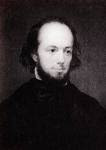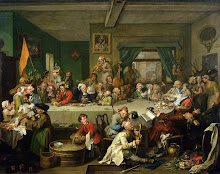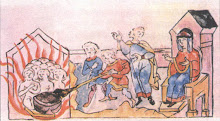"The exact contrary of what is generally believed is often the truth"Among the tawdrier writings about Edgar Allan Poe, it has become quite popular to attribute Rufus Griswold's enmity towards him as being largely inspired by jealousy over Frances S. Osgood. It is, like the story that Osgood was estranged from her husband when she knew Poe, one of those fallacies that can't seem to be killed off with an axe. According to this tradition, Griswold and Poe were both suitors for Osgood's favor (never mind that all three were married,) a competition that maddened Griswold to the point where he took a brutal literary revenge against his dead rival. (Left unasked is the question of how to explain Poe's many other, even more vicious calumniators--Thomas Dunn English, Charles F. Briggs, Lewis Gaylord Clark, etc. Are we to believe that they were all motivated by lust for that histrionic little flittermouse Mrs. Osgood and what English so memorably described as her "infantile act?")
-Jean de la Bruyere
 This melodramatic balderdash was, of course, started by that queen of melodramatic balderdash, Sarah Helen Whitman. (In tribute to the extent that she and her ether bottle managed to muddy the waters of Poe biography, I hereby nominate Mrs. Whitman for this blog's prestigious Sallie Robins Memorial Award.**) She is, in fact, the only source for the "jealousy" legend. What planted this idea in her head was a note Griswold wrote his friend Mary Hewitt in the spring of 1850. Hewitt, wishing to clarify Griswold's motives in regard to his infamous Poe memoir, later passed the letter on to Whitman. We do not have this note, but Whitman later quoted Griswold as writing, "I am getting on rapidly with my 'Life of Poe,' and am trying hard to do him justice, for Fanny's spirit looks down on me while I write."
This melodramatic balderdash was, of course, started by that queen of melodramatic balderdash, Sarah Helen Whitman. (In tribute to the extent that she and her ether bottle managed to muddy the waters of Poe biography, I hereby nominate Mrs. Whitman for this blog's prestigious Sallie Robins Memorial Award.**) She is, in fact, the only source for the "jealousy" legend. What planted this idea in her head was a note Griswold wrote his friend Mary Hewitt in the spring of 1850. Hewitt, wishing to clarify Griswold's motives in regard to his infamous Poe memoir, later passed the letter on to Whitman. We do not have this note, but Whitman later quoted Griswold as writing, "I am getting on rapidly with my 'Life of Poe,' and am trying hard to do him justice, for Fanny's spirit looks down on me while I write."
Assuming Griswold actually made such a statement--and it does sound like him at his most sickeningly oleaginous--he and Hewitt obviously saw it as a defense of his insulting memoir. Griswold always piously claimed that he had been kind to Poe's memory, that he did a gentlemanly suppression of all sorts of never-described, but, he implied, unspeakable revelations about the dead poet. (One wonders how Griswold reconciled his ventures into forgery with his claims of "doing Poe justice," but never mind.) Presumably, the letter claimed he was presenting Poe in the best possible terms, out of Griswold's respect for Osgood's admiration for him. (Unless, of course, he knew that cruelly denegrating the dead man was exactly what "Fanny" would have wanted--and with this crowd, that's always a possibility.)
Hewitt obviously assumed this letter would convince Whitman of Griswold's good intentions--certainly, Hewitt would not have wanted to give the idea that her good friend and literary patron Griswold acted from base motives--but unfortunately Sarah Helen, as she so often did, took hold of the wrong end of the stick and allowed her drug-fueled imagination to run riot. She knew--as who did not?--of Osgood's flagrant public admiration for Poe, as well as Griswold's corresponding (and probably equally shallow and insincere) fondness for Osgood. Whitman thus came to the assumption that Poe's literary executor allowed jealousy of Osgood's partiality to lead him into character assassination. Whitman wrote that Griswold's "task" (of doing Poe "justice") "was evidently too great for him. He could not forgive him [Poe] the interest which he had inspired in the person he [Griswold] most wanted to please." In her strange little 1860 book, "Edgar Poe and His Critics," Whitman carried her fantasies even further, with an addled and completely irrelevant passage where viewing portraits of the trio led her to envision Poe and Griswold simultaneously battling for Osgood's praise and affection. (A footnote: Whitman's booklet does make an interesting read, if only as proof of her total and rather sad lack of understanding about Poe--as a man or a writer. Her complete misinterpretation of "Eureka" makes particularly painful reading.)
Her offbeat musings entered their way into Poe lore, despite their tenuous connection to reality. As some of Whitman's own contemporaries noted, it was absurd to picture Poe and Griswold as "rivals" over Osgood. When Poe knew her, Griswold was nowhere on the scene, and by the time she and Griswold became close, Poe was long gone from her life. And as at least one person at the time added, it was well known that Poe's interest in Mrs. Osgood was entirely literary. In addition, everyone who knew Griswold was aware that he had nursed a bitter hatred towards Poe for years before either man even met Osgood. Griswold undoubtedly felt a professional jealousy towards Poe, who was infinitely more talented and far from shy about advertising the fact. There is, however, no evidence whatsoever that he ever saw him as any sort of romantic rival. Even Griswold's friends conceded that he was hyper-sensitive and extraordinarily vindictive--not to mention mentally unstable--and it seems that Poe always had a particular gift for unsettling him. Griswold was, however, too frightened of Poe to openly express this loathing while his enemy lived, making his long-delayed counterattack all the fiercer.
And, in any case, let's be honest: At the time the two men knew her, Frances Osgood was middle-aged (by the female standards of the day,) sickly, unintellectual, childlike rather than seductive or flirtatious in demeanor, a wife and mother, and--as both Poe and her portraits attested--homely. She made a poor choice for the role of femme fatale.
What also works against the idea that Griswold was motivated by jealousy over Osgood is the fact that he did so much to promote the view that she and Poe had been close. Whitman herself quoted his note to Hewitt, where he virtuously portrayed himself as anxious to do Poe "justice" for Osgood's sake. He included her self-aggrandizing Poe reminiscences in his biography. He even concocted a fable where he described Poe, committed to reciting an original poem at the Boston Lyceum and paralyzed by writer's block, as begging Osgood to write a poem "equal to my reputation" that he could pass off as his own work. The best comment on this absurd story came from John H. Ingram, who snorted, "That a poem equal to his reputation could have been composed in a week, or any length of time, by Mrs. Osgood...none knew better to be impossible than Poe." Griswold's collusion with Osgood in publicizing her friendship with Poe hardly indicates any romantic envy.
The popularity of the notion of a Poe/Osgood/Griswold triangle is a perfect example of the fundamental unseriousness of most modern Poe research.
**A Footnote: Sallie Robins was an Ohio woman who shortly before the Civil War, began researching Poe's life for a planned published defense of the poet. Unfortunately, her investigations soon caused her to go hopelessly mad. This is not an uncommon side-effect among Poe biographers.
















No comments:
New comments are not allowed.